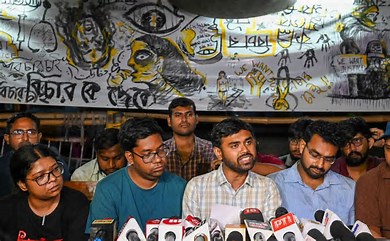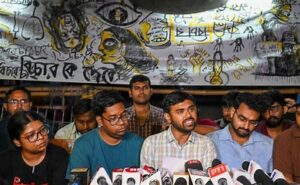Five days after partially resuming their duties at Government-run hospitals in West Bengal, junior doctors today alleged non-cooperation from the Trinamool Congress Government. The West Bengal Junior Doctors’ Front has alleged that the State Government has revoked its permission for a convention scheduled on September 27, intended to discuss the future direction of their movement for justice for the RG Kar rape-murder victim. They also said that the Government was foisting police cases on those who supported their movement. Alleging that the State Government has withdrawn its permission for the convention at a State-run auditorium, the doctors, in a statement, alleged that the Government has put up roadblocks to booking other auditoriums.
“This will backfire as we will not stay away from the path of agitations for justice,” the statement said. “We will go ahead with our convention at SSKM auditorium on the scheduled date of September 27 at 4 pm to decide on the future roadmap,” it said.
The doctors alleged that senior Government functionaries have told them: “Why are you still continuing agitation when most of your demands have either been met or looked into?”
Calling it intimidation, they said, “Our apolitical movement for justice for our sister will not stop till we achieve our objectives.”
The junior doctors today reached out to Chief Secretary Manoj Pant through an email with a reminder of their unresolved issues from a meeting held on September 18. The doctors, represented by the West Bengal Junior Doctors’ Forum (WBJDF), expressed their concerns in a detailed two-page email.
In their correspondence, the junior doctors pointed out that no significant actions or orders have been implemented regarding the key demands discussed during their earlier meeting with Pant and a special task force. They stressed the importance of addressing these issues promptly, emphasising that many of their proposals were verbally agreed upon but remain unaddressed.
One of the primary demands is the establishment of a central inquiry committee to investigate the alleged “threat culture” present in medical colleges across the state. The WBJDF is also advocating for the creation of ‘college-level inquiry committees’ within individual institutions, which should include both undergraduate students and resident doctors to probe those accused of perpetuating a hostile environment.
Additionally, the forum reminded Pant of their call for an inquiry committee to be set up against members of the West Bengal Medical Council (WBMC) and the West Bengal Health Recruitment Board (WBHRB). These members are accused of fostering a threat culture and being involved in health syndicates. The doctors have requested that this committee be formed within the next seven working days. Other demands highlighted in the letter include the establishment of a task force or monitoring committee in every medical college and hospital, along with a transparent transfer policy for all recruited medical personnel.
The junior doctors had initially resumed their duties on September 21 following a 42-day strike, which was sparked by the rape and murder of an on-duty female doctor at RG Kar Medical College and Hospital on August 9. The WBJDF’s renewed call for action underscores the urgency of their demands and the need for systemic change within the state’s healthcare system.
After an 11-day sit-in outside the State Health Department headquarters, the protesting doctors had partially resumed emergency and essential services at State-run hospitals following discussions with the Government.














